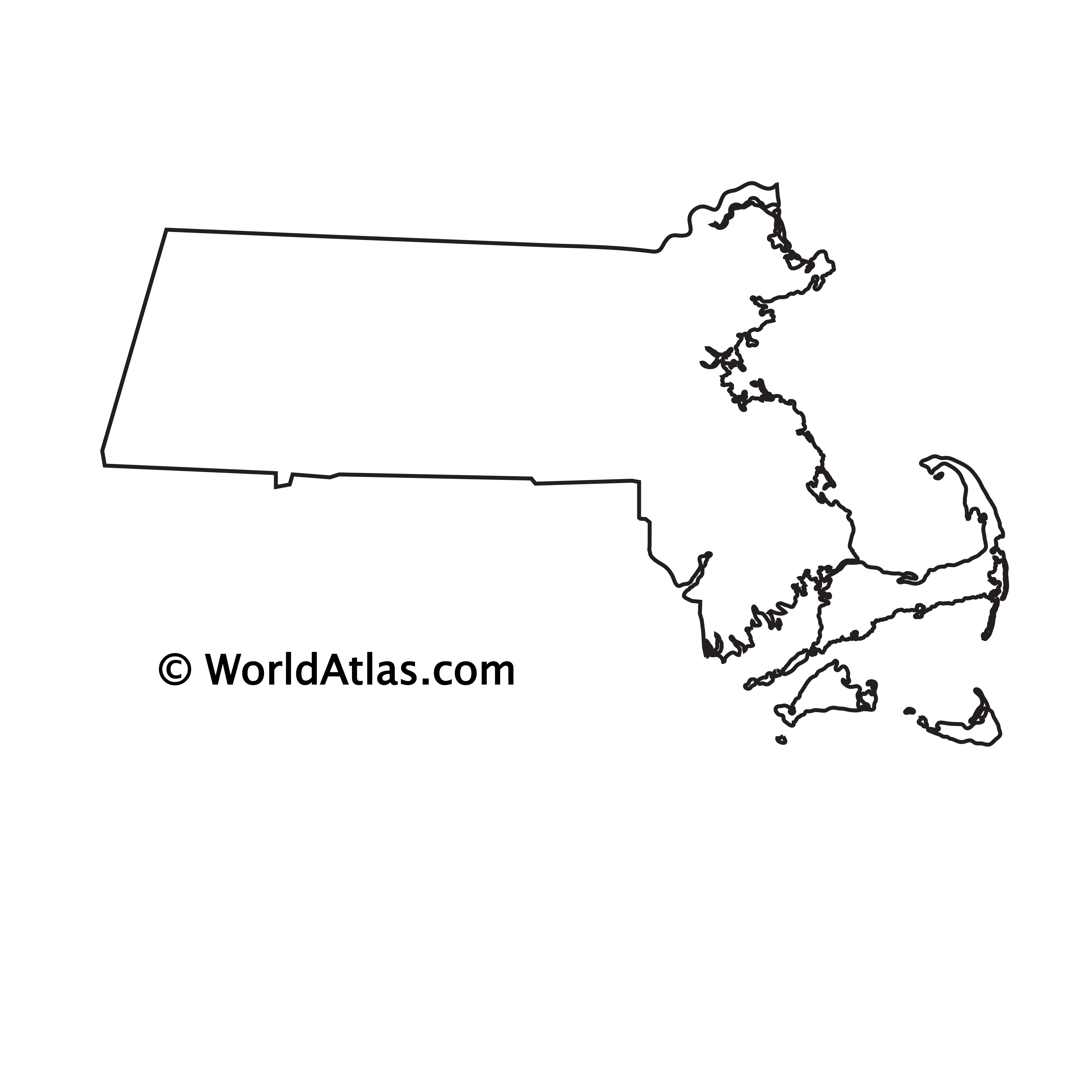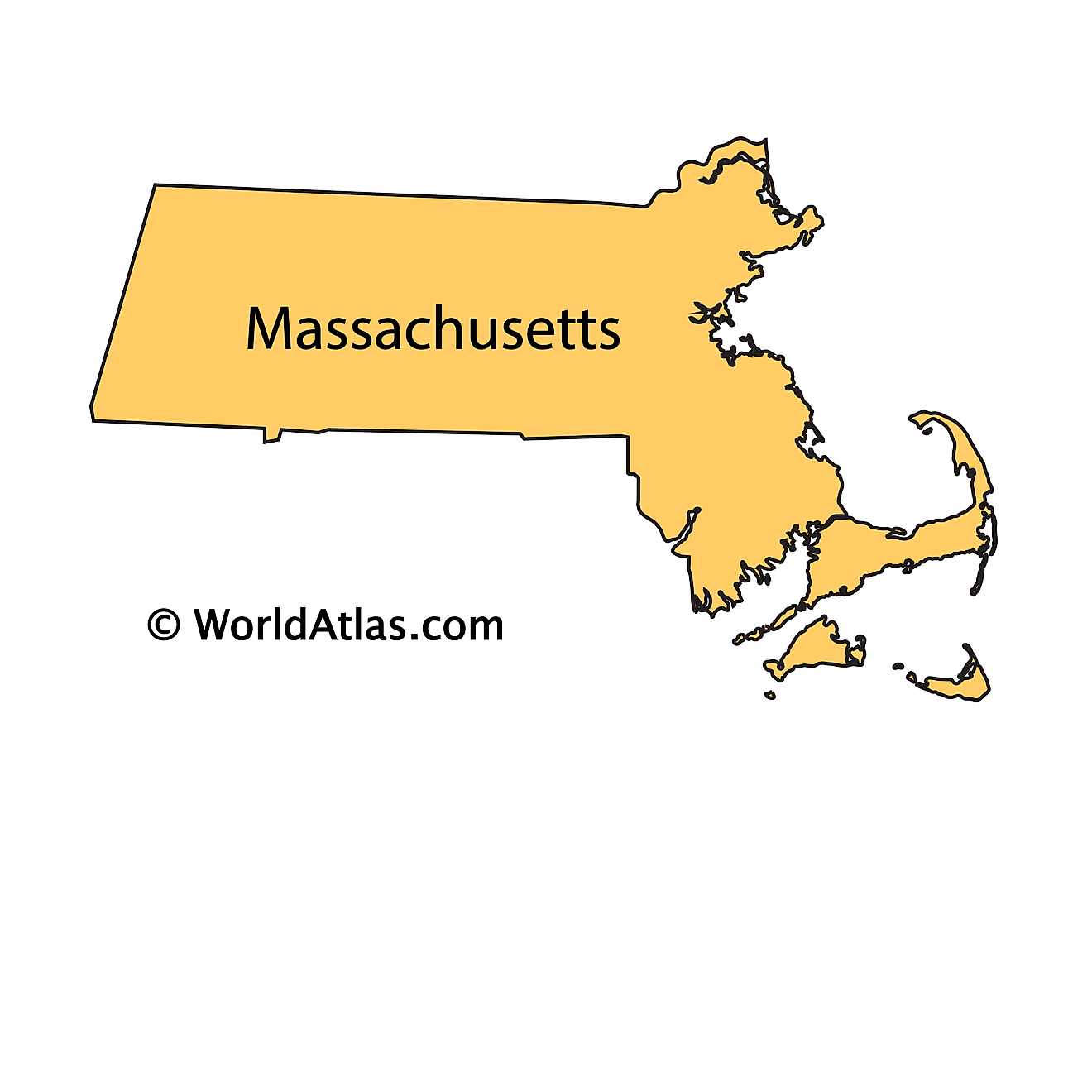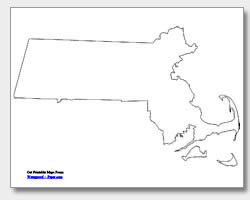Unveiling the Shape of Massachusetts: A Comprehensive Guide to the State’s Outline Map
Related Articles: Unveiling the Shape of Massachusetts: A Comprehensive Guide to the State’s Outline Map
Introduction
With great pleasure, we will explore the intriguing topic related to Unveiling the Shape of Massachusetts: A Comprehensive Guide to the State’s Outline Map. Let’s weave interesting information and offer fresh perspectives to the readers.
Table of Content
Unveiling the Shape of Massachusetts: A Comprehensive Guide to the State’s Outline Map

The outline map of Massachusetts, a simple yet powerful visual representation, serves as a gateway to understanding the state’s geography, history, and culture. This guide delves into the intricacies of this map, exploring its features, uses, and significance.
Understanding the Outline Map: A Visual Guide to Massachusetts
The Massachusetts outline map is a simplified depiction of the state’s boundaries, showcasing its unique shape. It is a versatile tool with numerous applications, offering a clear visual representation for various purposes.
Key Features of the Outline Map
- Boundaries: The outline map clearly defines the state’s borders, distinguishing it from neighboring states like Rhode Island, Connecticut, New Hampshire, and Vermont.
- Landmass: It highlights the relative size and shape of the state, revealing its elongated form stretching from north to south.
- Coastal Features: The map showcases the state’s extensive coastline, including Cape Cod, Martha’s Vineyard, and Nantucket.
- Major Cities: Prominent cities like Boston, Worcester, Springfield, and Cambridge are typically marked, providing a visual overview of urban centers.
- Geographic Features: The outline map often includes notable geographic features such as the Berkshire Mountains, the Connecticut River Valley, and the Cape Cod Bay.
Applications of the Massachusetts Outline Map
The outline map finds diverse applications across various fields:
- Education: Educators use it to teach students about the state’s geography, location, and key features.
- Planning and Development: Planners and developers rely on the map to understand land use patterns, identify potential development sites, and analyze infrastructure requirements.
- Tourism and Recreation: Travelers and outdoor enthusiasts use the outline map to plan trips, explore different regions, and locate points of interest.
- Historical Research: Historians use the outline map to trace historical events, study settlement patterns, and understand the state’s evolution.
- Political Analysis: The map assists in visualizing electoral districts, analyzing voting patterns, and understanding political trends.
Beyond the Outline: Exploring the Details
While the outline map provides a fundamental understanding of the state’s shape, a more detailed map can reveal a wealth of information:
- Elevation: Detailed maps show the state’s topography, highlighting the varying elevations of the Berkshires, the coastal plains, and the central plateau.
- Water Bodies: Comprehensive maps showcase the extensive network of rivers, lakes, and reservoirs, including the Connecticut River, Lake Champlain, and the Quabbin Reservoir.
- Transportation Infrastructure: Detailed maps illustrate the state’s road network, rail lines, and major airports, facilitating navigation and understanding transportation patterns.
- Land Use: Maps depicting land use patterns reveal the distribution of forests, agricultural areas, urban centers, and recreational spaces.
- Historical Sites: Maps highlighting historical sites allow exploration of significant landmarks, battlefields, and cultural heritage locations.
The Importance of the Massachusetts Outline Map
The Massachusetts outline map serves as a valuable tool for various purposes, fostering understanding and appreciation for the state:
- Visual Representation: It provides a simple and effective way to visualize the state’s geography and key features.
- Educational Tool: It aids in learning about the state’s history, culture, and natural environment.
- Planning and Development: It supports informed decision-making in areas such as urban planning, infrastructure development, and environmental conservation.
- Tourism and Recreation: It facilitates planning and exploration, encouraging tourism and outdoor recreation.
- Historical Research: It supports the study of historical events, settlement patterns, and cultural heritage.
FAQs about the Massachusetts Outline Map
Q: What is the most prominent feature of the Massachusetts outline map?
A: The distinctive shape of the state, resembling a bent arm or a fishhook, is the most prominent feature.
Q: What are the major cities depicted on the outline map?
A: The outline map typically includes prominent cities like Boston, Worcester, Springfield, and Cambridge.
Q: What are the key geographic features shown on the map?
A: The outline map often includes the Berkshire Mountains, the Connecticut River Valley, and the Cape Cod Bay.
Q: What are some of the uses of the outline map in education?
A: Educators use the map to teach students about the state’s geography, location, and key features.
Q: How does the outline map assist in planning and development?
A: Planners and developers use the map to understand land use patterns, identify potential development sites, and analyze infrastructure requirements.
Tips for Using the Massachusetts Outline Map
- Choose the right map: Select a map with appropriate detail and scale based on your specific needs.
- Refer to additional resources: Combine the outline map with other sources like atlases, historical maps, and online resources for comprehensive information.
- Engage with the map: Use the map to explore the state’s geography, locate points of interest, and plan trips.
- Share your findings: Use the map to share your knowledge and insights about Massachusetts with others.
Conclusion
The Massachusetts outline map, a simple yet powerful tool, provides a visual gateway to understanding the state’s geography, history, and culture. Its diverse applications in education, planning, tourism, research, and politics highlight its importance in fostering knowledge, appreciation, and informed decision-making. By exploring the outline map and its various applications, we can gain a deeper understanding of the unique character of Massachusetts and its place in the broader landscape of the United States.








Closure
Thus, we hope this article has provided valuable insights into Unveiling the Shape of Massachusetts: A Comprehensive Guide to the State’s Outline Map. We thank you for taking the time to read this article. See you in our next article!